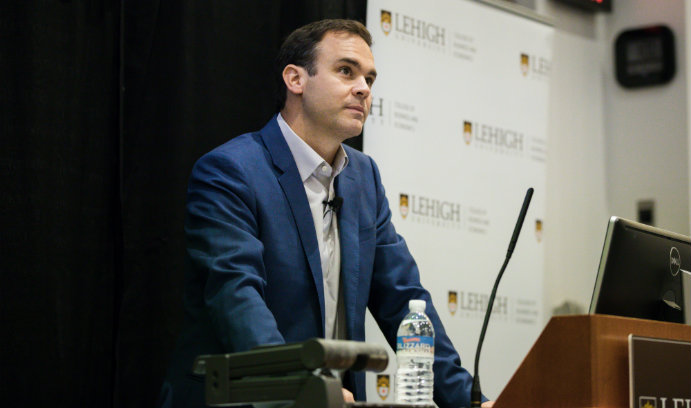3 More Online MBA Scholarships You Should Know

Last month, three of the best Online MBA scholarships in the U.S. caught our imagination. These advantageous opportunities can be found at celebrated academic institutions like the USC Marshall School of Business and the University of North Carolina Kenan-Flagler Business School.
However, we would be remiss if we stopped there. Here are three more Online MBA scholarships you need to remember before you start sending out applications.
3 More Online MBA Scholarships You Should Know

The Lehigh University College of Business and Economics FLEX MBA gives students the opportunity to participate in classes either online or on campus. The nationally-ranked program emphasizes values like leadership, social responsibility, and understanding global business. FLEX MBA students who have received an offer of admission as a regular students may be considered for a variety of scholarship options. For example, the Dean’s Scholarship may be awarded based on academic merit, and the Nanovic ‘60G Endowed Fellowship Fund will go to students who show outstanding performance within the FLEX MBA Program and “contribution to the program outside of the classroom.”

Dayton University’s MBA@Dayton offers tracks based on applicants’ academic and/or professional experience. Students can pursue the Foundational Online MBA, the Accelerated Online MBA, or the One-Year Online MBA, depending on their experience and goals. According to the school, applicants will be considered for “select competitive awards offered by the MBA@Dayton program or can identify private independent scholarships for which they can apply separate of the application or the federal aid process.”

The Santa Clara University Leavey School of Business has multiple scholarship opportunities in its Online MBA program. Enrolled students can apply for merit-based scholarships, including “a $1,000 Online MBA Referral Scholarship, and a $500 Online MBA GMAT Test Bonus for those who submit GMAT scores with an application.” In addition, Certificate of Advanced Accounting Proficiency (CAAP) program grads can apply for a $3,000 Online MBA scholarship.
Working in Healthcare? Rutgers Dishes New Advice – New York News

Let’s explore some of the most interesting stories that have emerged from New York business schools this week.
Working In Healthcare? Here’s How to Stay Relevant – Rutgers Business School News
The Rutgers Business School recently shared five reasons its Masters in Healthcare Services Management is the “answer for professionals … who want to up their game with analytic skills, leadership development and business knowledge.”
- Analytical skills are a necessity: “Data provides critical insights needed to inform better decision-making and improve operational efficiencies.”
- It’s all about delivering value: Stay “up-to-date about changes in health care and…value-based practices that ensure quality services.”
- Empowered to bring about change: “Students learn what it takes to change practices, make operational improvements, and be effective leaders.”
- It’s not as hard as you think: “Many courses can be taken online to supplement time in the classroom. And students are able to waive up to six credits for eligible work experience.”
- Hands-on learning: “Students in the program are required to complete a capstone project that gives them a chance to work with a real healthcare provider on an actual problem.”
You can read more from the recent RBS article here.
Answering the Call for AT&T: Interns’ Insights Add Value at Company’s Indian Operations – Stevens Institute of Technology School of Business News
The Stevens Institute of Technology SOB blog recently highlighted some positive accolades from AT&T Business’s senior VP of Service Excellence Paul Rosenbaum, specifically regarding the company’s longstanding history with Stevens.
Rosenbaum expressed his pleasure with the Business Intelligence & Analytics students who interned at the company’s office in Hyderabad, India this past summer. “We know the quality of the students, and many of our executives are Stevens alumni. My team in India and my team in the U.S. were really impressed with these students’ capabilities,” he says.
He explains that because “Stevens business students are bilingual in business and analytics [they are] well suited to leading technical teams.”

Five Stevens School of Business interns, alongside several colleagues and AT&T employees, from the company’s Hyderabad office / Photo via stevens.edu
Of the experience in Hyderabad, Sanjay Pattanayak, ’18, writes, “This is the first place I’ve worked where equal opportunity is given to individuals to bring ideas to the table or suggest solutions, rather than just top-down leadership.”
“Having that independence, and being encouraged to put your ideas into action, enables the development of you as an individual and strengthens the organization.”
You can read more about the school’s program and Rosenbaum’s observations here.
Lehigh Announces New Philly Focus for Flex MBA – MetroMBA
Next Spring, Lehigh’s Flex MBA program will unveil two non-degree courses developed by the MBA Test Drive Program for prospective students at the school’s Center City Philadelphia location (1800 JFK Blvd).
“From Plan to Action: Strategy and Organization” will investigate “business model development in today’s competitive environment as well as the use of disruptive innovation in strategy development” while “From Private to Public Company: A Path to Exit” will survey the “considerations involved” in taking a company public.
You can learn more about the new Lehigh Flex MBA course offerings here.
Lehigh Announces New Philly Focus for Flex MBA

In early 2019, Bethlehem, Pennsylvania’s Lehigh University College of Business and Economics will roll out its brand new Philadelphia-focused coursework for those interested in the Flex MBA program.
Telecommuting and the Gig Economy, and More – New York City News

Let’s explore some of the most interesting stories that have emerged from New York business schools this week.
The Changing Workplace – Lehigh College of Business and Economics News
The Lehigh College of Business and Economics recently published an overview of the impact that telecommuting continues to have on the future of work—and the surging gig economy.
“With email, instant messaging, smartphones, Skype for Business, Webex, and other connecting technologies, more and more companies are allowing their employees to work from home—even if home is a thousand miles from the corporate headquarters.”
Case in point: Vermont Department of Economic Development’s recent announcement that it would give $10,000 cash to anyone who wanted to move to the Green Mountain State and work remotely.
Ride-hailing services Uber and Lyft, as well as platforms like Upwork, which connect organizations and freelancers, depend on the flexible schedules of side-hustlers and entrepreneurs alike.
Lehigh Associate Professor of Management Naomi Rothman writes, “Being able to work from home for periods of time to care for children could enable more women to stay in the workforce and advance. If we have these issues of women not being able to make it to the upper echelons of corporate America, part of that reason is they are having work/life-balance issues.”
She adds, “Flexibility is one of the most important and critical solutions in helping dual-career families. In families in which you have two professions with both parents working, issues of child care become a fundamental problem. Flexibility is one thing that parents say allows them to keep their careers on track.”
Lehigh Professor of Management Andrew Ward predicts that the larger economy will more closely resemble the structure of the motion picture industry.
“When a movie is [green lit] by a studio, they bring together hundreds, even thousands, of workers—from the director and stars to the gaffers and the gofers—to make the movie. Once the film is done, they all move on to other projects. Some continue to work together on various projects, sometimes at the same studio, but many do not.”
You can read the full Lehigh College of Business and Economics News article here.
Consulting Challenge Win Leads to Hubble Contacts Concept Trial – Gabelli Connect
The Fordham University Gabelli School of Business recently published an overview of a recent student collaboration with Hubble Contacts’ co-CEO and co-founder Jesse Horwitz and Director of Internal Operations Barbara Almeida, MBA ’17.
Hubble Contacts, a “direct-to-consumer online marketplace for contact lens subscriptions,” is interested in finding new ways to reach consumers and increase revenue.
Joanne Ball, MBA ’20, and her team of students (Andrew Clark, Oliver Flynn, Sandeep Jacob, and Jessica Nebbeling) devised a campus pop-up shop that “would offer free eye exams and a student discount … to allow them to create a physical presence for their online DTC brand and also engage their target at a younger age segment.”
You can read the full piece from Gabelli Connect here.
Binghamton University Unveils New Master of Science in Data Analytics Program – Binghamton SOM Blog
Binghamton SOM announced a new 1-year, 30-credit Master of Science in Data Analytics (MSDA), the result of a cross-disciplinary partnership with Thomas J. Watson School of Engineering and Applied Science and the Harpur College of Arts and Sciences.
The MSDA, which qualifies as a STEM degree, will give students a “comprehensive foundation in data analytics, while also giving them confidence in the analytical, quantitative, technical and leadership skills needed for successful careers in data analysis.”
MSDA Program Director and Binghamton SOM Professor of Marketing Manoj Agarwal writes, “With three schools behind the curriculum of the program, we believe a multidisciplinary approach will produce successful, multidisciplinary graduates who can face the unstructured data challenges of the future.”
The first MSDA cohort is due to kick off July 2019.
Click here to find out more about the Binghamton 30-credit Master of Science in Data Analytics program.
Cornell Introduces Grade Non-Disclosure – New York News

Let’s explore some of the most interesting stories that have emerged from New York business schools this week.
Johnson Students Vote to Enact Grade Non-Disclosure – Johnson Business Feed
After a year-long study initiated by Johnson’s Student Council to “evaluate the alignment of academics and recruiting,” Cornell Johnson students have “voted to enact a policy of grade non-disclosure” in which Two-Year, One-Year, and Johnson Cornell Tech MBA students need not “disclose their grades to recruiters until after a full-time, post-graduation job offer has been extended.”
Associate Dean for MBA Programs Vishal Gaur writes “We hope that grade non-disclosure will encourage students to take more academic risks and think holistically about their education, personal development, leadership, and the impact they want to have in the future.”
Victoria Wilmarth (MBA ’18), who is now Brigham and Women’s Hospital’s Deland Fellow in Hospital Administration believes “the vote will strengthen the school’s collaborative community.”
“This vote helps bring Johnson’s academic experiences into alignment with the school’s values. I think this will deepen students’ commitment to collaborative learning and support academic risk taking for professional and personal development.”
You can read the entire Johnson Business Feed article here.
Five New Faculty Bring Mix of Research Insight, Corporate Experience to Business School – Stevens Institute of Technology School of Business News
For the 2018-19 school year, the Stevens Institute of Technology School of Business welcomed five new professors, all of whom are well equipped to help students “think critically about technology’s role in solving business problems.”
- Assistant Professor Apostolos Filippas: “Research interests include business analytics, natural language processing, data science, online platforms and market design.”
- Assistant Professor Pranav Garg: “Studies human capital, organizational design and learning, and strategy.”
- Associate Professor Anand Goel: Formerly a Director with Navigant Consulting whose “corporate experience is enhanced by research work that has been featured in many top journals, including the Journal of Financial Economics, Review of Financial Studies, and Journal of Finance.”
- Assistant Professor Majeed Simaan: Research interests include “banking and risk management, financial networks and interconnectedness, and portfolio theory and asset allocation.”
- Assistant Professor Jordan Suchow: Formerly a “research scientist with the Berkeley Artificial Intelligence Research Lab at the University of California–Berkeley.”
You can find out more about the new hires here.
New York Times‘ David Gelles: ‘When CEOs Speak Out, the World Listens’ – Lehigh College of Business Blog
New York Times business reporter David Gelles used his keynote speech at the recent Lehigh University College of Business and Economics 2018 Impact Symposium to posit “companies can no longer afford to sit on the sidelines when it comes to the hot button issues of the day.”
“On topics ranging from climate change to health care, gun laws to birth control, the biggest brands in the country are being forced to take a stand. It’s hard to state what an abrupt change this is,” he explains.

Gelles at the recent Lehigh University College of Business and Economics 2018 Impact Symposium / Photo via Christa Neu
He adds, “Until recently, companies avoided controversy at all costs. But these days, they are confronting it head on, sometimes even embracing it when it arrives unexpectedly, and in rare instances, seeking it out.”
Gelles points to Salesforce founder and CEO Marc Benioff’s threat to relocate its Indiana office in response to a 2015 law that would have “made it easier for religious conservatives to refuse service to gay people.”
Gelles explains, “Being a chief executive no longer means just running a profit and loss statement. It means being prepared to articulate your values—and your company’s values—when you least expect it. When CEOs speak out, the world listens. Sometimes, policies even change.”
You can read more about Gelles’ speech at Lehigh here.
Happiness, Net Worth, and Materialism – Chicago News

Let’s explore some of the most interesting stories that have emerged from Chicago business schools this week.
How To Be Happy Without Earning More – Booth Business Blog
The University of Chicago Booth School of Business recently published a lengthy profile that explores “hedonomics,” a term that professor Christopher K. Hsee appropriated to use as a “counterpart” to traditional economics, which studies how “to extract more happiness from the existing stuff.”
Hsee explains, “Our ancestors had to work to accumulate enough to survive. But now productivity is so high, we don’t need to work so hard for survival.”
In 2008, Hsee and his Booth compatriot Reid Hastie “redefined” the term from its original meaning as the “study of ways to interact with machines.” The article explains that “their version of hedonomics is premised on the idea that people don’t need more resources to be happier; they need to use existing resources differently,” such as a child who grows weary of wooden blocks they initially enjoyed. “Hedonomics suggests the child doesn’t need more blocks to be happy; she needs to change how she plays with those blocks.”
One component of hedonomics is the “hedonic treadmill,” coined by Northwestern’s Philip Brickman and Lehigh’s Donald T. Campbell, which refers to the psychoeconomic effect of what happens when it “takes more and more things to make people happy.”
According to the article, “The hedonic treadmill fires up because people misunderstand what will actually make them happy. [In fact], people gain more happiness when they satisfy their inherent rather than learned preferences—needs rather than wants.”
Hsee’s research could be useful in developing countries where the middle class continues to grow and more developed countries where the middle class has begun to diminish, particularly with the prospect of millions of people becoming idle due to automation looming in the background.
“You can make idle people happy by giving them a reason to ‘play with the existing blocks’ without accumulating more blocks.”
You can read more about hedonomics here.
Aric Rindfleisch’s Research Delves Into Reducing Materialism in Younger Consumers – Gies School of Business Blog
University of Illinois Gies College of Business Professor of Business Administration and Marketing Aric Rindfleisch, who researches consumer values, recently published a paper in the Journal of Positive Psychology, which presents “strategies for reducing materialism in younger consumers.”
According to the Gies School of Business Blog, “The impact of gratitude on adolescent materialism and generosity” has led to two studies that offered “fostering gratitude” as an effective strategy to combat materialism in adolescents.

Aric Rindfleisch, Gies College of Business Professor of Business Administration and Marketing
“In the first study, children and adolescents with a grateful disposition were less materialistic.” The second study found that ‘gratitude journals’ “significantly reduced materialism and also attenuated materialism’s negative effect on generosity.”
You can read more about Rindfleisch’s research here.
New Study Contradicts Notion That Electronic Health Records are Driving Doctors to Quit – Mendoza Ideas & News
Notre Dame Mendoza College of Business Professor of IT, Analytics, and Operations Corey Angst has coauthored a new study due for publication in Information Systems Research, which finds that electronic health records (EHRs) have “increased doctors’ tenure at hospitals.” This discovery stands in direct opposition to certain prominent articles, which assert that EHRs have caused doctors to retire.
“The Mobility of High Status Professionals after the Implementation of Enterprise Information Systems, which was coauthored with the University of Minnesota’s Brad Greenwood and McGill’s Kartik Ganju, examines how EHRs affect the “decision of physicians to continue practicing at their current hospital.”
Angst says, “Results suggest that when EHRs create benefits for doctors, such as reducing their workloads or preventing costly errors, their duration of practice increases significantly.”
“However, when technologies force doctors to change their routines, there is an obvious exodus, though it’s more pronounced with older doctors, especially specialists, and those who have been disrupted in the past by IT implementations,” he adds.
Angst notes that “doctors won’t be scared off as hospitals continue adopting new technologies — as long as they’re not too disruptive to routines.”
You can read more about the research here.
